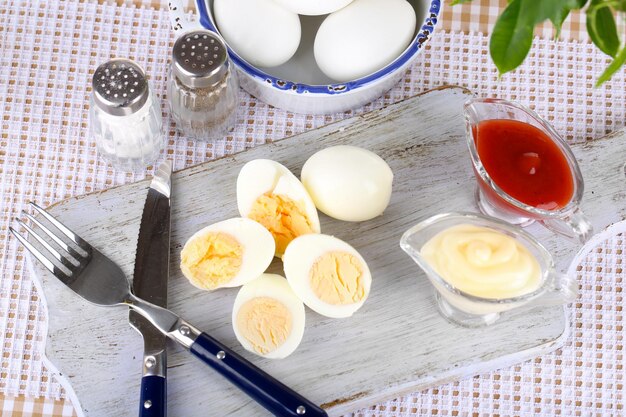How Long Can You Keep Soft Boiled Eggs In The Refrigerator? 🍳
Ever wondered how long those deliciously gooey soft-boiled eggs can last in your fridge? You're not alone. This guide will take you through everything you need to know about storing soft-boiled eggs, from best practices to common pitfalls, ensuring your eggs remain fresh and tasty for as long as possible.
🥚 Understanding Soft-Boiled Eggs
Soft-boiled eggs are a breakfast favorite, featuring a firm white and a runny yolk that can elevate any meal. But, maintaining this delicate balance of textures hinges on proper storage. Here's why understanding their shelf life matters:
- Safety First: Eggs are perishable items that can harbor bacteria if not stored correctly.
- Flavor and Texture: Proper storage ensures that the unique taste and texture of soft-boiled eggs remain intact.
- Waste Reduction: Knowing how long eggs last can help minimize waste and make meal planning more efficient.
Storing Soft-Boiled Eggs in the Fridge
🗓️ How Long Do They Last?
The general consensus is that soft-boiled eggs will stay fresh in the refrigerator for about 2 days. Unlike hard-boiled eggs, which can last up to a week, the runny yolk of a soft-boiled egg creates a more welcoming environment for bacteria, making it essential to consume them quicker.
🌡️ Storage Tips
To maximize the shelf life of soft-boiled eggs and ensure they remain safe to eat, consider the following tips:
- Refrigerate Promptly: After boiling, let the eggs cool and then refrigerate them within two hours.
- Use an Airtight Container: Store the eggs in a clean, airtight container to prevent odors from the fridge from seeping into the eggs.
- Label with Dates: For easy tracking, always label your containers with the date you boiled the eggs.
Dos and Don'ts of Egg Storage
✅ Do:
- Store eggs in their shells. The shell provides natural protection against bacteria.
- Cool eggs in an ice bath before refrigerating to halt cooking and maintain texture.
- Keep your fridge at or below 40°F (4°C) to inhibit bacterial growth.
❌ Don't:
- Store eggs in the fridge door. This area experiences temperature fluctuations when opened.
- Peel and store soft-boiled eggs. Once peeled, their shelf life reduces significantly.
🕒 Signs of Spoilage
Your senses are your first line of defense against spoiled eggs. Here are some signs to watch out for:
- Smell: A sulfur-like or rotten odor is a clear indication of spoilage.
- Texture: A slimy or excessively runny yolk may mean the egg has gone bad.
- Appearance: Any visible spots or changes in color should be treated with caution.
🍽️ Practical Uses and Meal Ideas
Fresh soft-boiled eggs are a versatile ingredient across many dishes. Whether you're a cooking novice or a seasoned gourmet, here are some ideas to inspire your culinary creativity:
- Ramen Topping: Use them as a savory topping for ramen—the creamy yolk blends beautifully with the broth.
- Salad Boost: Add sliced eggs to a hearty salad for an extra protein kick.
- Breakfast Staple: Pair with toast and avocado for a nutrient-packed breakfast.
😕 What Happens If Your Eggs Go Bad?
Understanding the implications of consuming spoiled eggs is crucial:
- Health Risks: Spoiled eggs can contain harmful bacteria like Salmonella, leading to foodborne illnesses.
- Waste Management: Disposing of bad eggs improperly can contribute to waste issues—compost if possible.
🧑🍳 Preparing Soft-Boiled Eggs
Not sure how to achieve that perfect soft-boil? Follow these steps for consistent results:
- Bring a pot of water to a boil.
- Gently lower the eggs using a slotted spoon.
- Reduce to a simmer and cook for about 6-7 minutes.
- Transfer eggs to an ice bath right after cooking to stop further cooking.
🔍 Summary: Key Tips for Storing Soft-Boiled Eggs
Here's a quick rundown of essential tips to remember:
- 🍳 Best Practice: Refrigerate promptly and consume within 2 days.
- 🥶 Storage: Use an airtight container and maintain cool temperatures.
- 🚫 Avoid: Leaving eggs at room temperature for extended periods.
- 👃 Checking Freshness: Rely on your senses to spot spoilage.
Final Thoughts: Why Proper Storage Matters
Properly storing soft-boiled eggs is crucial not just for maintaining their flavor but also for your health. With these guidelines, you're now equipped to enjoy your eggs safely and savor that perfect runny yolk. Whether you're making an elegant brunch or a quick snack, remember: keeping your eggs fresh isn't just about preserving taste—it's about ensuring each bite is safe and satisfying. 🥚🍽️
This article has walked you through the fundamental aspects of storing soft-boiled eggs, emphasizing safety, practicality, and enjoyment. By following these storage guidelines, you can fully enjoy the culinary versatility soft-boiled eggs offer while minimizing any health risks. Happy cooking! 🍳

